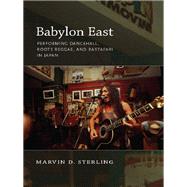Babylon East
, by Sterling, Marvin D.- ISBN: 9780822347057 | 0822347059
- Cover: Hardcover
- Copyright: 6/8/2010
An important centre of dancehall reggae performance, sound clashes are contests between rival sound systems: groups of emcees, tune selectors, and sound engineers. InWorld Clash 1999, held in Brooklyn,Mighty Crown, a Japanese sound system and the only non-Jamaican competitor, stunned the international dancehall community by winning the event. In 2002, the Japanese dancer Junko Kudo became the first non-Jamaican to win Jamaica's National Dancehall Queen Contest. High-profile victories such as these affirmed and invigorated Japan's enthusiasm for dancehall reggae. InBabylon East, anthropologist Marvin D. Sterling traces the history of the Japanese embrace of dancehall reggae and other elements of Jamaican culture, including Rastafari, roots reggae, and dub music. Sterling provides a nuanced ethnographic analysis of the ways that many Japanese involved in reggae as musicians and dancers, and those deeply engaged with Rastafari as a spiritual practice, seek to reimagine their lives through Jamaican culture. Sterling considers Japanese performances and representations of Jamaican culture in clubs, competitions, and festivals; in the city and the countryside; in song lyrics, music videos and on websites; and in texts including reggae magazines, travel writing, fiction, and self-help books. He illuminates issues of race, ethnicity, gender, sexuality, and class as he discusses topics ranging from the cultural capital that Japanese dancehall artists amass by immersing themselves in dancehall culture in Jamaica, New York, and England, to the use of Rastafari as a means of critiquing class difference, consumerism, and the West's and Japan's colonial pasts. Encompassing the reactions of Jamaica's artists to Japanese appropriations of Jamaican culture, and the two countries' relative positions in the world economy,Babylon Eastis also a rare ethnographic analysis of Afro-Asian cultural exchange and global discourses of blackness beyond the African diaspora.






